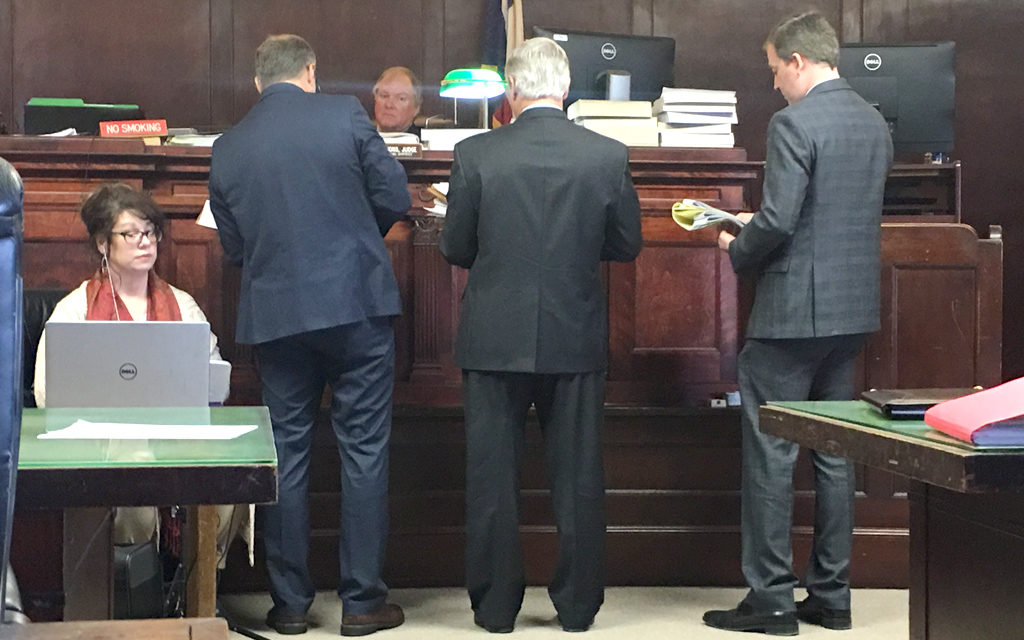More Time Grants To Plaintiff…Again
“We’re wasting our time and our money, spending lots of Teague’s money, Fairfield’s money on discovery right now in a case where this court lacks jurisdiction to decide it,” states Eric Storm attorney for the City of Fairfield as the City of Teague requests another continuance in the ongoing lawsuit between the two cities.
The cities met again in court for another hearing in the suit filed by Teague last year citing a breach of the twenty-nine year old Interlocal Definitive Agreement between the two municipalities and Texas Department of Criminal Justice’s (TDCJ) Boyd Unit.
Judge Patrick Simmons ordered the parties to meet in his courtroom in Limestone County on Wednesday, January 23, 2019, a week earlier than planned, to hear Teague’s motion for another continuance.
Andrew Messer, attorney for the City of Teague, again requested more time to review the 57,717 pages of records received from Fairfield since investigation into the Agreement began in April 2018, obliging Teague’s requests for more than twenty years of records and information regarding the jointly owned facilities at the Boyd Unit.
“If I spent a minute looking at each page of those documents it would take me roughly nine hundred and twenty-eight hours, twenty-three weeks, five and a half months if I worked exclusively by looking at nothing else but those documents eight hours a day and did paperwork,” illustrated Messer.
Messer maintained that due to the significance of this case, it is only fair to have more time to review the documents before proceeding.
He also noted that the engineer’s study of the facilities was just conducted by Teague’s engineering firm, TRC Engineers, Inc., the previous week, a process that has been delayed waiting on approval from prison administrators.
However, attorney Eric Storm representing the City of Fairfield disagreed.
“Just to read back to the volume of the documents, obviously that’s a function of the breadth of their requests,” said Storm.
He reminded the court that their previous hearing, Judge Simmons had admonished Teague’s attorneys to limit their discovery to only the issues relating to the plea for jurisdiction.
As an example, he produced the most recent request received from Teague’s attorneys since that hearing requesting any and all documents regarding Fairfield’s prior City administrator, including but not limited to his personnel file.
Storm called Teague’s recent requests for information “ridiculously broad” and not limited to the plea for jurisdiction.
He explained that Fairfield has produced all documents relating to TDCJ.
Storm contended that much of the information recently requested by Teague’s attorneys had either already been provided by Fairfield earlier in the discovery process, or has nothing to do with the lawsuit itself.
“Our motion is purely on the law,” Storm affirmed. “We’re saying this is not the kind of contract for which sovereign immunity is waived.”
Fairfield’s attorneys’ goal has been to prove that the city maintains sovereign immunity, meaning that the city is immune from civil prosecution.
He cited a recent Texas Supreme Court ruling stating that in order to determine whether sovereign immunity applies the court must look at the original nature of the contract.
The ruling states that the focus must be on whether the municipality was operating in a governmental or propriety function when they entered the contract, not at the time the alleged breach occurred.
“The law of sovereign immunity applies because this is an interlocal governmental agreement,” he explained. “It’s called, in fact, the Interlocal Definitive Agreement, and by statute an interlocal agreement is, by law, a contract to perform government functions and services.”
He maintained that since water and sewer systems are governmental functions, the nature of the interlocal agreement is not a proprietary one.
Storm also informed the court that according to the Texas Supreme Court, a trial court must determine at its earliest opportunity whether it has the authority to decide the case before allowing litigation to proceed.
He accused Teague’s attorneys of using stall tactics and noted Messer’s expressed intent to seek a Rule 172 audit, which Storm says will take the case out of court, depriving Fairfield of their opportunity for a jury trial, and putting the decision in the hands of an auditor.
“We filed our plea for jurisdiction October 16th. We’ve been waiting for four months. We’re entitled to our day in court. We need to decide if this is the kind of case that can go forward or not,” concluded Storm.
“We feel confident that they will be denied and we will move forward,” responded Messer.
“We will seek an audit. We want another third party that’s independent to come in and look at the books for the two cities.”
“To be fair, it helps us give a report to the court. You can make that decision, you can look at it. We think that’s a fair way to go about this.”
Messer requested that the court allow adequate time to conduct discovery before proceeding with litigation.
Judge Simmons interjected, asking if there is any more discovery to be conducted.
Messer clarified that the additional time requested is to review all of the items collected during the discovery process.
“I want the most information I can get to make this decision,” said Judge Simmons, reiterating the significance of this case and its potential to one day be appealed in a higher court.
“Let’s put off this idea that somehow this case will be resolved in the next month, that’s not going to happen,” urged Simmons, “But I’d like as much information as possible to make what I would hope would be a correct ruling.”
He asked Storm what objections Fairfield has to granting another continuance. Storm replied that Fairfield would be agreeable if discoveries would cease.
Judge Simmons ordered an end to discovery and depositions for both parties, directing Storm and Messer to hold off until the time of their hearing.
Furthermore, he requested that both parties submit their respective case law and additional information to him to review in the interim.
Judge Simmons reminded both parties to focus on the matter at hand – establishing the court’s jurisdiction.
Simmons tentatively set the date of February 27th at 1:30 p.m. in his Freestone County Courtroom.





